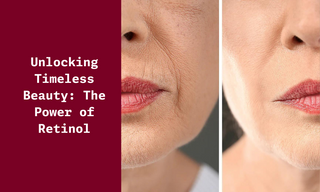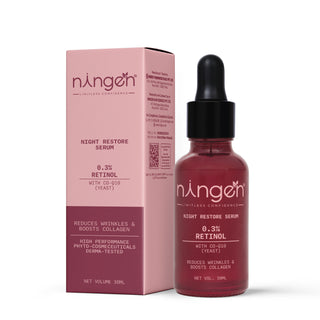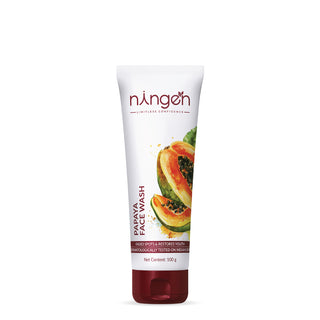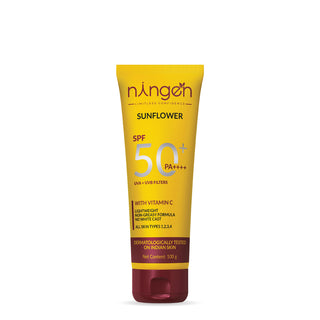Step into the world of timeless beauty with the magical touch of Retinol!
What makes it so special? Well, it's like a superhero for your skin. Imagine it as a secret formula that can return time, revealing fresh and glowing skin. In our journey together, we'll discover how Retinol works its magic, making you feel like you've found the fountain of youth.
Get ready to embrace the power of Retinol – because who doesn't want to look and feel timeless?
What is Retinol?
Retinol is a form of vitamin A that is commonly used in skincare products, known for its wide range of benefits for the skin. It is a powerful ingredient that can help smooth away wrinkles and fine lines, fade dark spots and uneven skin tone, boost collagen production, minimize pores, and refine texture.
Retinol works by stimulating the production of new skin cells, while also increasing the production of collagen, which helps to keep the skin firm and reduce the appearance of wrinkles. It also helps to fade dark spots and improve uneven skin tone by promoting cell turnover and increasing the rate at which new, fresh skin cells are produced. Additionally, retinol can help to minimize pores and refine skin texture, leaving the skin looking smoother and more even.
Retinol is like a superhero for your skin! It's a special ingredient that helps your skin stay healthy and look great. When you use products with Retinol, it's like giving your skin a boost to stay young and fresh. So, if you want your skin to be happy and glowing, Retinol is here to help!
Types of Retinol
Retinol comes in various forms, each with its characteristics. Here are the different types of Retinol:
Retinol:
- Description: The most common form of Vitamin A derivative used in skincare.
- Characteristics: Mild and suitable for most skin types; known for reducing fine lines and improving skin texture.
Retinyl Palmitate:
- Description: A gentler form often used in products for sensitive skin.
- Characteristics: Mild, less potent than Retinol, suitable for those new to Vitamin A derivatives.
Retinaldehyde:
- Description: Intermediate form between Retinol and retinoic acid.
- Characteristics: More potent than Retinol, but less irritating than retinoic acid; effective for skin renewal.
Adapalene:
- Description: A synthetic retinoid used for treating acne.
- Characteristics: Known for its anti-inflammatory properties; suitable for acne-prone skin.
Tretinoin (Retinoic Acid):
- Description: The most active form available by prescription.
- Characteristics: Potent; effective for treating acne and reducing signs of aging; may cause more skin sensitivity.
Understanding these different types allows individuals to choose a form of Retinol that best suits their skin type and skincare goals. It's advisable to start with milder forms and gradually progress to stronger ones, consulting a skincare professional if needed.
Retinol benefits for skin
Discover the transformative power of Retinol for radiant skin. Known for its unparalleled benefits below
- Reduced Wrinkles and Fine Lines:
- Stimulates collagen production, promoting skin elasticity.
- Diminishes the appearance of wrinkles and fine lines.
- Improved Skin Texture:
- Enhances skin cell turnover, resulting in smoother skin.
- Minimizes rough patches and uneven texture.
- Evened Skin Tone:
- Fades dark spots and hyperpigmentation.
- Promotes a more uniform and radiant complexion.
- Acne Treatment:
- Regulates oil production, preventing clogged pores.
- Helps in treating acne and minimizing breakouts.
- Increased Firmness:
- Boosts skin firmness and resilience.
- Improves overall skin structure.
- Prevention of Premature Aging:
- Acts as an antioxidant, neutralizing free radicals.
- Guards against environmental damage, preventing premature aging.
- Enhanced Hydration:
- Improves the skin's ability to retain moisture.
- Reduces dryness and promotes a hydrated, plump appearance.
- Minimized Pore Size:
- Helps in unclogging pores and reducing their appearance.
- Creates a smoother skin surface.
- Treatment for Sun Damage:
- Assists in repairing sun-damaged skin.
- Addresses sunspots and photoaging effects.
- Overall Skin Renewal:
- Supports cellular regeneration for a fresh and revitalized look.
- Contributes to a healthier and more youthful skin appearance.
Note: Visit the link to learn more about reducing aging signs.
How Retinol Works for Skin: Unraveling the Science Behind
Once inside the skin, retinoic acid stimulates collagen production and increases cell turnover. Collagen is a protein that provides structure and elasticity to the skin, while increased cell turnover helps to shed old, damaged skin cells and promote the growth of new, healthy cells. This process can result in firmer, smoother, and more youthful-looking skin.
By promoting collagen production and cell turnover, Retinol helps to reduce the appearance of fine lines and wrinkles, improve skin texture, and even out skin tone. It also helps to prevent and reverse some of the signs of skin aging, making it a popular ingredient in anti-aging skincare products.
By enhancing the skin's ability to retain moisture, Retinol promotes hydration.
Hydrated skin appears plump and healthy, reducing the prominence of fine lines.
Retinol helps fade dark spots and addresses hyperpigmentation concerns.
It inhibits the overproduction of melanin, contributing to a more even skin tone.
It promotes the formation of new blood vessels in the skin that help improve blood flow and contribute to a healthy, radiant complexion.
Retinol works wonders for your skin by leveraging its unique molecular properties and interactions at the cellular level. It communicates with skin cells, directing them to behave in a healthier, more youthful manner.
It activates specific receptors, initiating a cascade of events that influence gene expression.
Understanding the science behind Retinol allows for a deeper appreciation of its transformative effects, making it a powerhouse ingredient in skincare routines for maintaining youthful, radiant skin.
How to use Retinol?
To incorporate Retinol into your PM skincare routine, start with a clean face. Apply 3-5 pumps of Retinol onto your fingertips and gently spread it over your face, neck, and around the eye contours. Leave it on overnight and do not rinse it off.
It is crucial to use sun protection (SPF) the morning after, as Retinol can make your skin more susceptible to sun damage. Additionally, top it off with a thick moisturizer to keep your skin supple. Be cautious when using Retinol, as it may cause skin purging as your skin adjusts to the product.
It's essential to start with a lower concentration of Retinol and slowly increase the usage to avoid irritation. Always patch test before incorporating it into your routine.
Also if you are a beginner, use Retinol 2-3 times a week for the first 2 weeks, then gradually increase to daily use.
Following these guidelines will help you maximize the benefits of Retinol while minimizing any potential side effects.
When to start Retinol?
It is recommended to start using Retinol in your skincare routine in your mid to late 20s, particularly if you are concerned about preventing signs of aging. However, individuals with specific skin concerns, such as acne, uneven skin tone, or large pores may consider incorporating Retinol into their routine at an earlier age.
However, it is important to be aware of potential side effects, such as dryness, redness, and irritation. It is important to start with a low concentration of Retinol and gradually increase use as the skin becomes acclimated.
Ultimately, the decision to start incorporating Retinol into your skincare routine should be based on your age, skin type, and specific skincare concerns. Be sure to consult with a dermatologist before starting any new skincare regimen to determine the best approach for your individual needs.
Note: Learn more about fine lines and how to reverse them.
Risk factors of using Retinol
Potential risk factors of using retinol include skin purging, sensitivity, and increased sun sensitivity. Skin purging is a common reaction when using retinol, causing a temporary increase in acne or blemishes. Retinol can also cause skin sensitivity, leading to redness, irritation, and peeling. Additionally, it can make the skin more prone to sun damage, resulting in increased sun sensitivity and the potential for sunburn.
Encapsulated retinol in SQINOX Renewal Complex Retinol Face Serum can mitigate these risks by delivering the retinol in a controlled manner. The encapsulation helps to protect the retinol from breaking down too quickly on the skin, reducing the likelihood of skin purging and irritation. Furthermore, the controlled release of retinol can help minimize the risk of increased sun sensitivity, allowing for safer use during the day. This can result in a more gentle and effective experience when incorporating retinol into a skincare routine, making it suitable for those concerned about potential risk factors associated with retinol use.
When to see a doctor?
If you experience side effects from using Retinol, it's essential to monitor your skin's response and consult a doctor if:
Severe Irritation Persists:
- If redness, itching, burning, or peeling becomes severe and doesn't subside with time, seek medical advice is crucial.
Persistent Dryness or Flakiness:
- Excessive dryness or flakiness that persists despite adjusting your skincare routine may require professional evaluation.
Worsening of Acne or Breakouts:
- If Retinol use leads to an increase in acne or breakouts, it's advisable to consult a dermatologist to reassess your skincare approach.
Allergic Reactions:
- If you develop signs of an allergic reaction, such as swelling, severe itching, or difficulty breathing, seek immediate medical attention.
Eye Irritation:
- If Retinol comes into contact with your eyes, causing irritation, redness, or blurred vision, seek medical help promptly.
Persistent Discomfort:
- If you experience persistent discomfort, pain, or a burning sensation that doesn't improve, consult a healthcare professional.
Excessive Sun Sensitivity:
- If your skin becomes excessively sensitive to the sun, leading to sunburn even with minimal exposure, medical advice is warranted.
Unwanted Pigmentation Changes:
- If you notice unusual pigmentation changes, such as dark spots or patches, consulting a doctor is important for a comprehensive evaluation.
Remember, individual responses to Retinol vary, and it's crucial to communicate openly with your healthcare provider about any concerns. They can guide you in adjusting your skincare routine, recommend alternative products, or address any underlying issues. Always follow their advice for a safe and effective skincare experience.
Retinol-compatible and non-compatible products
When incorporating Retinol into your skincare routine, it's essential to be mindful of compatible and non-compatible products to maximize benefits and minimize potential irritation. Here's a general guide:
Retinol-Compatible Products:
Gentle Cleansers:
- Use mild, hydrating cleansers to avoid stripping the skin of essential oils.
Hyaluronic Acid Serums:
- Hyaluronic acid helps retain moisture, complementing Retinol's potential drying effects.
Non-Irritating Moisturizers:
- Opt for fragrance-free, non-comedogenic moisturizers to maintain skin hydration.
Sunscreen:
- Broad-spectrum SPF is crucial to protect skin from increased sensitivity to the sun caused by Retinol.
Vitamin C Serums:
- Vitamin C complements Retinol by providing antioxidant benefits and supporting collagen synthesis.
Niacinamide Products:
- Niacinamide can work synergistically with Retinol, promoting a balanced and calm complexion.
Retinol Non-Compatible Products:
Products with Benzoyl Peroxide:
- Combining Retinol with benzoyl peroxide may increase irritation and decrease effectiveness.
Alpha and Beta Hydroxy Acids:
- Avoid using products containing salicylic acid, glycolic acid, or other exfoliating acids simultaneously, as they may intensify skin sensitivity.
Vitamin A Derivatives:
- Combining Retinol with other vitamin A derivatives may lead to excessive irritation and potential adverse effects.
Physical Scrubs:
- Abrasive physical exfoliants can exacerbate Retinol-induced sensitivity and should be used cautiously.
Harsh Cleansers:
- Avoid harsh or astringent cleansers that can strip the skin of natural oils.
Fragranced Products:
- Fragranced products may increase the risk of irritation, especially when combined with Retinol.
Always introduce new products gradually to observe how your skin responds. If irritation occurs, consider spacing out the use of Retinol or adjusting the concentration. Consulting with a dermatologist can provide personalized advice based on your skin type and concerns.
Discover our collection of essential skincare products enriched with Retinol. Explore our handpicked selection in the dedicated section below.
Conclusion
Hope this article The Power of Retinol helped to guide you about Retinol and its uses in skincare. Retinol emerges as a potent force in skincare, derived from vitamin A, orchestrating cellular symphonies for collagen synthesis, skin renewal, and a radiant complexion. Beyond a cosmetic choice, Retinol stands as an innovation in dermatology, addressing fine lines and wrinkles.
Embracing Retinol isn't just about aesthetics; it's a self-care investment. Navigating skincare intricacies involves understanding the science, selecting compatible products, and expert guidance. Incorporating Retinol into our routines is a journey where science meets beauty, unfolding chapters in the story of ageless, radiant skin.
Let Retinol be the key to unlocking timeless beauty – where science and self-care converge for a complexion transcending time.
Frequently Asked Questions (FAQs)
Question 1. What is Retinol, and how does it benefit the skin?
Answer: Retinol is a derivative of vitamin A known for its skin-renewing properties. It enhances collagen production, reduces wrinkles, and promotes a more even skin tone.
Question 2. How does Retinol work on a molecular level?
Answer: Retinol interacts with skin cells, activating specific receptors. This engagement influences gene expression, leading to improved skin renewal and collagen synthesis.
Question 3. What skincare concerns does Retinol address?
Answer: Retinol is effective in reducing fine lines, wrinkles, and hyperpigmentation. It also helps with skin texture, promoting a smoother and more youthful appearance.
Question 4. Can anyone use Retinol, or are there specific skin types it suits best?
Answer: While generally suitable for various skin types, those with sensitive skin may need to start with lower concentrations. Consulting a dermatologist is recommended for personalized advice.
Question 5. When is the best time to incorporate Retinol into a skincare routine?
Answer: Retinol is typically applied at night after cleansing. Start with a lower concentration and gradually increase frequency to allow the skin to adjust.
Question 6. Can Retinol be used alongside other skincare products?
Answer: Retinol can be combined with compatible products like hyaluronic acid, vitamin C, and niacinamide. However, it's advisable to avoid simultaneous use with certain active ingredients to prevent irritation.
Question 7. Are there any side effects associated with Retinol use?
Answer: Common side effects include mild redness, dryness, or peeling during the adjustment period. If severe irritation occurs, it's recommended to consult a healthcare professional.
Question 8. How long does it take to see results with Retinol?
Answer: Results vary, but improvements in skin texture and reduction in fine lines may be noticeable within a few weeks to months with consistent use.
Question 9. Can Retinol be used during pregnancy or breastfeeding?
Answer: It's advisable to consult a healthcare professional before using Retinol during pregnancy or breastfeeding, as high doses may have potential risks.
Question 10. Are there different forms or concentrations of Retinol, and how do they differ?
Answer: Yes, Retinol is available in various concentrations. Higher concentrations may provide more significant results but can also lead to increased sensitivity. Starting with a lower concentration is recommended for beginners.










